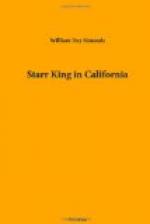Brilliant as was the record of King as the champion of the Sanitary Commission in California it was by no means the beginning and end of his philanthropic labors. The forlorn condition of the Chinese — as men without rights of citizenship — stirred his sympathy and he made earnest effort to secure for them such civic rights as belong to industry. The cause of labor, seldom thought in those days to come within the scope of a minister’s interest or duty, commanded his eager attention, and he improved every opportunity to declare his reverence for the world’s workers in earth, and stone, and iron. In a fine passage in a lecture on “The Earth and the Mechanic Arts,” he writes:
“If we were to choose from the whole planet a score of men to represent us on some other globe or in some other system in a great human fair of the universe, it would not be kings, dukes, prime-ministers, the richest men, we should appoint as ambassadors to show what our race is, and what it is doing here, but the great thinkers, artists, and workers, the thinkers in ink, the thinkers in stone and color, the thinkers in force and homely matter, the men who are bringing the globe up towards the Creator’s imagination and purpose; and on this mission the leaders of mechanic art would go side by side with Shakespeare and Milton, Angelo and Wren, Newton and Cuvier.
“In England, now, they are preparing statues of Brunel the engineer, and the Stephensons, father and son, to be finished and erected about the same time with those of Macaulay and Havelock. The nation is beginning to bow to the occupations and the genius that have added to her power ten thousand fold, — is beginning to bow to labor, noble, glorious, sacred labor.”
Not alone in public pleas for unpopular causes but in private charity King seemed tireless. “He had the rare facility in everything he said and did of communicating himself; the most precious thing he could bestow.” We are told that a multitude in distress came to this overburdened man. Ringing his doorbell they found entrance, and always as they came back, the “step was quicker which was slow before, the head was up which was down before, and the lips wreathed in smiles that were sad before.”
Thus we can see that it was not solely his eloquent defense of liberty and justice which caused a San Francisco journal, reporting his funeral, to say, “Perhaps more deeply beloved by a vast number of our people than any other who has lived and toiled and died among us.” His good deeds made him worthy of this, one of the most beautiful eulogies ever given mortal man, “No heart ever ached because of him until he died.” This was Starr King the philanthropist, a friend to all who needed his friendship.




